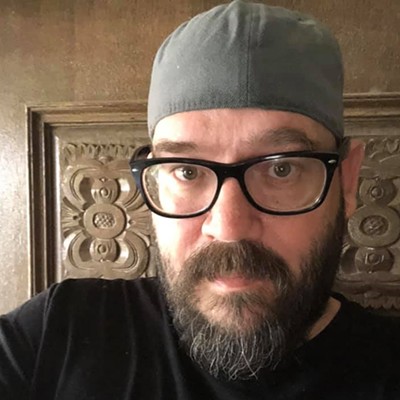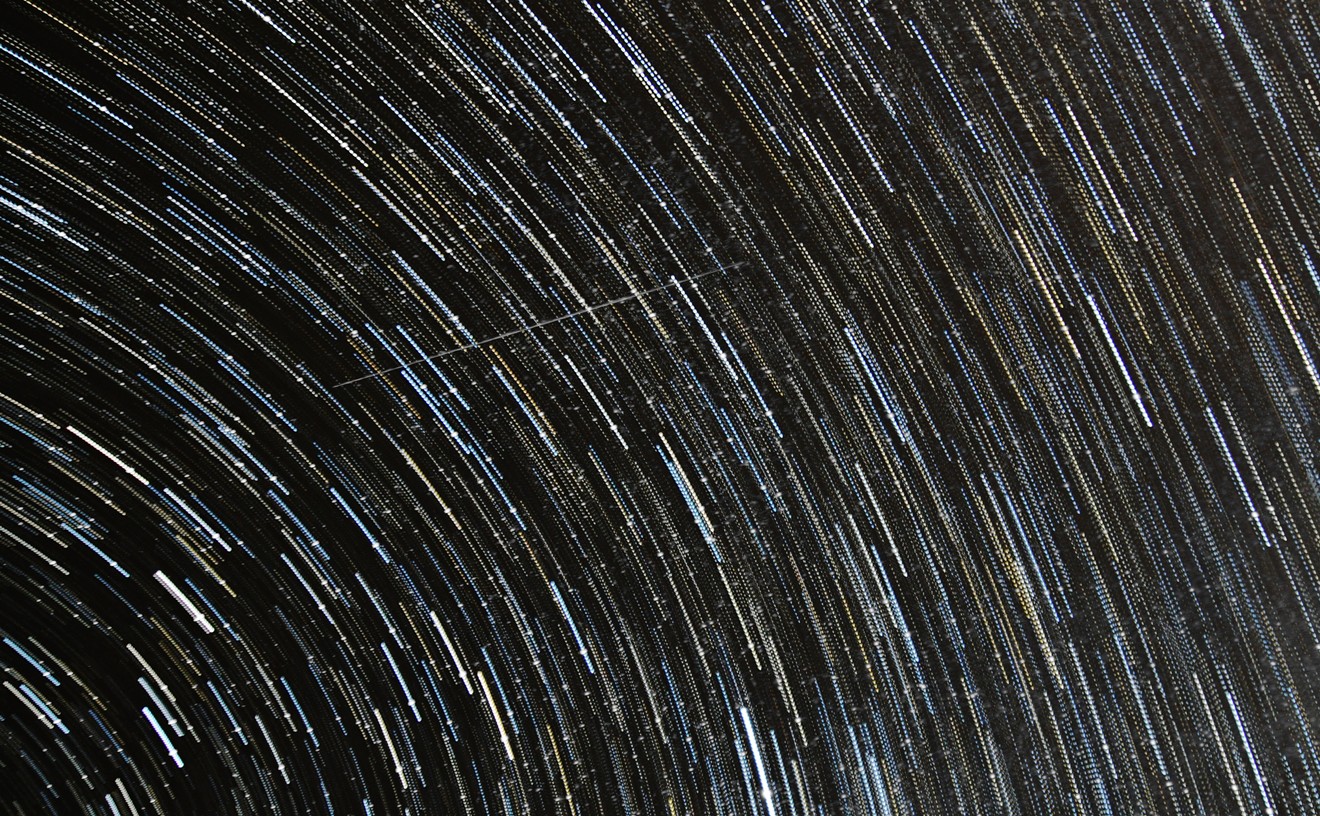Steven Wright likes to keep his comedy short but sweet. And plenty weird. Throughout his 30-year career In the early 1980s, the legendary comedian has condensed his quips into curt absurdist punchline, uttered in his trademark low-key and deadpan style, typically without setup or lengthy embellishment. (For example: "It's a small world, but I wouldn't want to have to paint it.")
Wright got his big break on the Tonight Show when the comedian made the late Johnny Carson crack up with laughter via his weirdly erudite observations of the world (One of our favorites: "I bought a house, on a one-way dead-end road. I don't know how I got there.")
In the three decades since, he's appeared in numerous independent movies, including Quentin Tarantino's debut film Reservoir Dogs, and even guest-starred recently on Louis C.K.'s hysterical FX television show.
Wright will be one of the headliners of the Phoenix Comedy Festival this weekend, which will raise funds for the Bill of Rights Memorial being built at the Arizona State Capitol. And although Wright didn't have much to say on the subject of free speech when Jackalope Ranch interviewed him recently, the comedian discussed his various influences (which include George Carlin and Salvador Dali), his deadpan style, and what it was like working with Tarantino.
Much of your humor is very cerebral in nature. Has there ever been times when people just don't get your jokes? No. There's times when I can get the point across pretty clearly, so when they don't laugh it's not that they don't get it, it's that they don't think it's funny. It's not that they don't understand what I'm talking about, because I'm not really talking about. I know it's really not that complicated.
My favorite joke of yours is when you mention going into a restaurant that serves breakfast anytime, so you ask for "French toast during the Renaissance." Thank you. A guy brought that one up to me yesterday actually. It's one of my favorite ones.
Do you get tired of hearing your bits repeated to you, like how much people love them. No, otherwise I would be digging ditches. I like that they bring them up like you just did.
Is there any sort of formula to your humor or is it just like how it comes out of your head? There's no formula. From the moment you wake up to when you go to sleep, you keep tiny pieces of information like a mosaic painting just drifting by all day just zapping all day until you go to sleep. Some of those things just like leap out or I connect with 'em. Oh look at that if you put that one over there, that's funny, that's not how that's usually looked at. It's like that. It's from noticing, simply from noticing. Comedians like Demitri Martin and the late Mitch Hedberg had a similar styles to your humor. Do you look on comedians like that as paying homage to you? I look on that as surprisingly that I had an impact. See, when I was doing this when I was 23 just trying to write jokes that were funny was all...just trying to write and doing that for years and years and years and not thinking that some kid is like 12 who's watching me and I'm on the Tonight Show and I'm 28 and 20 years later he's going to maybe be doing the standup and being influenced...never even entered my mind. I was trying to write jokes that worked so didn't know that I would be affecting other people later on. But that's just how everything is. We all are...everyone is influenced.
Who were your influences? I was influenced by George Carlin in about talking about tiny everyday things. My whole act is about little lint and the speed of light and cars...not that the speed of light is a little thing. Just like tiny things of life.
Were you a fan of Mitch Hedberg's comedy at all? When he was around, I heard some of it. I thought he was really good.
Do you think you are both perceived lumped into the same category of "wry comedian making weird observations"? I didn't even analyze it like that. I mean I don't even know all of his material. Everyone is taking in the information that you experience and then twisting it. Even a painter, everyone is just reacting to their surroundings. I don't really break it down any more, I don't even examine...it any more. I just do it. Even if I see a guy and I like him I'm not even breaking it down, it's like, oh, that's funny. When you first appeared on the Tonight Show in 1982, do you think you offered a different style of comedy than what was popular at the time? What I was doing was different. It was definitely different but it wasn't planned on being different. I was into surrealism in high school, painting surrealistically and not watching, looking at surrealistic paintings. What I'm saying is all tried to do is write jokes and they came out abstract. I didn't decide let me write weird jokes, I'm going to write abstract jokes. I didn't even break that down. I just thought, "Well, this sentence funny." Like breakfast anytime...well I think that might be funny. That's all I was concentrating on.
What was the idea behind your style of deadpan delivery? I happened to speak this monotone. When I was on stage I was very nervous so I had an extra blank face because I was scared out of my mind. And I said short jokes because I didn't want to be doing long set ups because I didn't want to be standing there without the audience laughing. Anyway, it all was just meshed together into this thing that was different. Its absolutely helps my whole career. But the focus was try to write the material. All the rest of it just fell into place by accident.
Have you kept your jokes short and pithy because you're afraid of bombing? I wasn't afraid of bombing. I didn't want to be standing...no one wants to bomb. I didn't want saying, "I was walking down the street na na na na and then this happened and na na na na and a guy came in and asked why are you doing that na na na na na and then say the funny part. I didn't want to say all of...I didn't want to talk for that long. I wanted to say something so they'd laugh. And say something because I thought it would uncomfortable to be talking for 30 seconds without the laughs.
Has your humor changed at all over the last 30 years, or has it always been in the same vein? Before I even went on TV I would connect the jokes into stories sometimes. There were these fake stories which would connect to jokes and then I stopped doing that and there was just one liners on there own and then I went on TV and everyone knew me from doing the one liners. But over the years I've gone back to connecting some of them into stories. Other than that it's the same. It's my mind, it's my thumbprint, it's a fingerprint. But it hasn't really changed. It's just seeing the weirdness in the world.
What other comedians are you really a fan of these days? Chris Rock, one of my favorites was Robert Schimmel who passed away a couple of years ago. Wanda Sykes, Louis C.K...there's just so many.
How did you wind up on Louis C.K.'s TV show? I was in New York hanging out with Louis over at his house -- we're friends and stuff -- and then he said, "Oh, do you want to be on this episode?" And I said okay. He's a genius.
Did you like the fact he put you in a very non Steven Wright role on the show? Yeah, he had me saying shit I would never say. He had me saying words I would never say in real life. You know, for his amusement. You mentioned you were influenced by a lot of abstract things early on in your life, painting and such. Which abstract artists or movies were you influenced by? Well, I grew up in Burlington, Massachusetts in the suburbs of Boston and I had an art class in the 11th grade and we went to field trip into Boston to one of the major museums. That's where I first saw surrealism. It jolted me, I thought this is unbelievable. I'd never seen it before. Those painters, I don't even remember their names. Salvador Dali, he's one of my heroes. Kurt Vonnegut, he's my literary hero. There's like so many movies -- Hal Ashby movies...Harold and Maude and Being There; David Lynch's first movie Eraserhead. I saw that when I was in college but me and my friends were like, "My God." Monty Python was a surreal influence. It was abstract, pop humor.
One of your more notable film roles was as the unseen radio announcer in Quentin Tarantino's Reservoir Dogs. Any chance you'd work with him again? Oh yes, of course I would. Absolutely. I've been so lucky.
Have you talked to him since the film came out 20 years ago? Yeah. I saw him a couple of times about a year ago.
Plus you've also worked with Jim Jarmusch on Coffee and Cigarettes. I've worked with so many geniuses. Yeah, he's amazing, that guy.
Why did you agree to participate in the Bill of Rights Comedy Festival? Well, it wasn't a comedy festival when it was mentioned to me which doesn't even matter. I don't even know why I'm saying that. Because Danny Zelisko, the producer, he's a really good friend of mine and he mentioned it and I thought it would be a really good thing to do a performance to raise money a monument to the Bill of Rights. You do a show for a purpose like that and it's a good thing to do.
Throughout your career you really haven't ascribed to political causes before. Political causes, I don't even see this as a political cause. I'm not into...Democrat, Republican, all that shit. But this is the overall United States. I guess it's political...I mean like it's beyond politics and that's how feel about it. It's the foundation of the story. It's the foundation of the place here without the idiots running around making speeches.
Do you think that comedians are the best people to defend the First Amendment? I mean, Lenny Bruce, George Carlin and Bill Hicks each extended Freedom of Speech in their own way. It's a great angle on it from comedians. I don't know if that's the best. Everyone you just mentioned, they're all truth machine guys. And that has an important impact on comedy if you know what's happening but a lot of comedians, they also have a great view of it and have stuff to say about it also.
The Phoenix Comedy Festival takes place at 7 p.m. on Sunday at Symphony Hall. Tickets start at $50.











